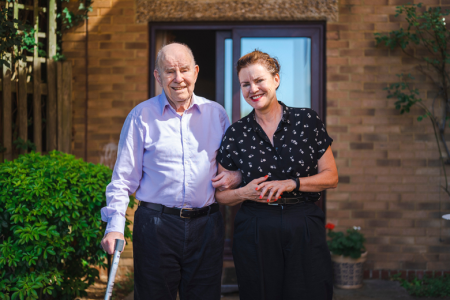When you start looking at a care home for yourself or a loved one, you will hear lots of different phrases and terms about the type of care you might need.
There are many types of care and support available, some of which are provided in the person’s own home and some of which will require them to be admitted to a care or nursing home. Everyone is different, and so it is important to arrange the type of care which is right for you or your loved one. Your/their needs may change over time, and so it is important to regularly review the type of care required.
Community (domiciliary) care – Many people begin with some level of care and support in their own home. This may be following a stay in hospital, or just due to a general deterioration in health and/or mobility. The aim of this type of support is to help maintain independence.
Community care can be used to fulfil an ongoing need such as domestic help, shopping, and personal care; or it may be short-term reablement support to help the person regain mobility and independence. Care staff may visit from as little as once a week to several times a day,depending on what is required.
Day Care – This takes place either in a care home or a day centre, and may be used in conjunction with community care. You or your loved one would visit during the day to have a meal and take part in activities; other services such as assisted bathing and podiatry may also be available. Day care is an ideal solution to loneliness in older people, particularly for those who live alone and have limited mobility.
Respite Care – In this type of care you or your loved one would be admitted to a care home for a set period (often 1-2 weeks) so that they or their carers can have a break. This is vital to ensure that the regular carers avoid burnout. People receiving respite care have the same service as permanent residents, including their own room, personal care, meals, and access to activities. Respite care is often (but not always) the first step towards a permanent move to a care home, as the person can experience life in a care home and, together with their carers, decide if it is right for them.
Residential Care – If you or your loved one can no longer manage to live at home due to physical frailty then you can move to a residential care home. Residential care is different for every individual, therefore whilst everyone has their own room, meals, and access to activities, some people may also require support with personal care such as washing and dressing. People living in a residential home will have a ‘Care Plan’ which details their needs, and these are followed by the care assistants on duty.
Nursing Care – If needs are more complex then you or your loved one may require nursing care, which has nursing staff onsite 24 hours a day. Nursing homes have the same facilities as residential care homes (many homes have both residential and nursing units) with additional care for those who require it.
Dementia Care – If someone is living with dementia then a dementia care home (or specialist unit within a care home) may be the best option for them. Dementia care homes have the same facilities as residential care homes, but have specially trained staff and may also have some features such as pictorial signs and coloured doors/handrails to help residents navigate their way around. There will also be additional safety measures such as key pads on doors.
Dementia with Nursing Care – This type of specialised care is for people who have a high level of clinical need in addition to dementia. Their needs cannot be met in either a nursing home or dementia care home.
Palliative Care – This type of care is given to people who have a life-limiting illness. Patients receiving palliative care may be living at home, or in a care facility. Their care aims to improve their quality of life, and may include psychological care and therapies in addition to medical support. People who are having palliative care may live for some time, however their conditions will progressively deteriorate.
End of Life – NHS England defines End of Life as the last year of a person’s life, although it is often less than that. End of life care can, in a similar way to palliative care, be give at home if this is what the person wishes. End of life care includes supporting the patient’s emotional, physical and spiritual needs, helping to manage symptoms, and supporting the person’s loved ones.
A medical professional and/or social worker will be able to offer advice on the type of care which you or your loved one require. Before any type of care is arranged, you can expect to communicate with the potential care provider to identify the person’s needs and preferences, which will usually involve a face-to-face assessment. In the case of a residential/nursing placement, you will need to discuss whether a suitable room is available and the costs.
Although arranging care can seem daunting and may involve feelings of guilt from the patient’s family and friends, it is important to remember that it is being done in the best interests of the patient. When care needs become complex it is better both for their quality of life and safety, and that of the carers, that their care is delivered by trained professionals, leaving you to resume your original role as a family member or friend.

